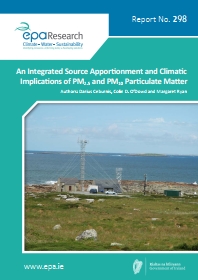Authors: Darius Ceburnis, Colin D. O’Dowd and Margaret Ryan
Summary: This fellowship enabled and sustained scientific operations at Mace Head Atmospheric Research Station. The advanced method of dual carbon isotope analysis will allow better identification of natural and anthropogenic source contributions, which is essential for quantifying human-induced global climate change.

The largest environmental pressures of the late 20th and early 21st centuries have been air pollution, with its ensuing health effects, and global climate warming, firmly attributed to anthropogenic greenhouse gas emissions. The above two effects are closely related, because aerosols offset a significant fraction of global warming induced by greenhouse gasses. Therefore, reducing air pollution with the aim of improving human well-being will result in stronger, accelerated warming, which is now becoming evident, especially over the Polar regions. Consequently, air quality issues have to be looked at concurrently with climatic implications, both of which can be enabled by observations carried out at the developed world-class infrastructure at Mace Head.
This fellowship consolidated and facilitated research efforts and outcomes at the Mace Head facility, with specific research topics aimed at informing policies such as the Clean Air Act and those of regional governments. It was found that a dramatic reduction in pollution – a 70% reduction in anthropogenic sulfate over the North-East Atlantic – simultaneously caused an increase in atmosphere brightness, which is accelerating global warming. Synergistic deployment of state-of-the-art instrumentation revealed that air pollution episodes in cities are caused by solid fuel combustion. The facilitation of several international network activities (EMEP, ACTRIS, MONET Programme for persistent organic pollutants) would not have been possible without this fellowship and returned great value for money.
The 26 research papers contributed by the fellowship holder demonstrate the scope and extent of the consolidated research efforts, leading to improved understanding of air quality and climate associations and better-informed policies at national and international level.
This fellowship enabled and sustained scientific operations at Mace Head Atmospheric Research Station. The advanced method of dual carbon isotope analysis will allow better identification of natural and anthropogenic source contributions, which is essential for quantifying human-induced global climate change. The sophisticated methodology developed using aerosol mass spectrometry is enabling unambiguous determination of the cause of urban air pollution.
https://www.epa.ie/media/epa-2020/publications/research/Research_298_thumnail[1].jpg